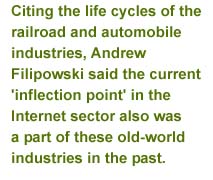SAN FRANCISCO (www.redherring.com) - Students of cinema will recall the famous piece of business advice imparted upon Dustin Hoffman's character Benjamin Braddock in the classic film, The Graduate. While Bill Gross, chairman and CEO of privately held incubator Idealab, didn't reiterate "plastics" to attendees of his Friday morning Internet World keynote speech, he did have a one-word tip for the sparse crowd: margins.
While certainly not the type of earth-shattering insight attendees dream of when mailing their convention checks, "margins" does highlight the current trend in the overall market as investors shift back to business fundamentals that seemed almost trivial among Internet companies just a year ago. After all, attendees and investors alike might do well to heed Gross' advice -- especially in light of Idealab's recent withdrawal of its IPO.
Listening to Gross, perhaps there's reason for investors looking at badly bruised technology stocks and attendees strolling through the convention's Internet graveyard to maintain some optimism.
Don't throw in the towel yet
Despite the overall negativity surrounding Internet-based ventures, Gross views the Web as still the most efficient and cost-effective means of communicating with customers. And due to the inherent ability of the Internet to create real-time, two-way interactivity, he feels that 80 to 95 percent gross margins for an Internet-based company are not beyond the realm of reality in the future.
 These margins are lofty for any company, let alone an Internet company under current market conditions. Plus, any business boasting such a phenomenal margin rate would overnight undoubtedly attract hordes of copycat companies attempting to carve out a piece of the action. Nevertheless, Gross points to eBay (EBAY: Research, Estimates) as a company that identified what he calls a "transformative business process" that took full advantage of the Internet's two-way communication and interactive capabilities to reach consumers. These margins are lofty for any company, let alone an Internet company under current market conditions. Plus, any business boasting such a phenomenal margin rate would overnight undoubtedly attract hordes of copycat companies attempting to carve out a piece of the action. Nevertheless, Gross points to eBay (EBAY: Research, Estimates) as a company that identified what he calls a "transformative business process" that took full advantage of the Internet's two-way communication and interactive capabilities to reach consumers.
While eBay certainly is not yet up to the high margin levels envisioned by Gross -- it had gross margins of 71 percent in its latest quarter -- it's one company that he feels grew to its current state by a "very long entry lead" -- namely, its ability to push ahead with its business plans early on, despite market skepticism for eBay as a viable business model.
One of the factors Gross expects to fuel growth in eBay-like companies leveraging the true interactive abilities of the Web is the continued increase in both the number of users and time spent online. On the high end of the scale, Gross said, he would not discount the possibility of a 100-fold increase in the number of users, and an increase to as much as two hours per day of Web time per user.
Barriers to entry by competitors
Competition is always a threat to a strong business model, but Mr. Gross feels that strong barriers to entry will allow a company like eBay to boost its margins over time. Indeed, just across the hall from Mr. Gross in the Internet Entrepreneurs Forum, Andrew "Flip" Filipowski, CEO of Divine Interventures (DVIN: Research, Estimates), the Lisle, Illinois-based incubator, echoed that sentiment and noted that, given market conditions, there is little possibility of "me too" companies getting funding, which only further strengthens Web leaders like eBay, Amazon.com (AMZN: Research, Estimates) and Yahoo! (YHOO: Research, Estimates).
Despite a nearly deserted conference room during his opening remarks -- which speaks to continued skepticism about the Internet sector -- Filipowski remained bullish on the outlook for Internet companies. Citing the life cycles of both the railroad and automobile industries, Filipowski said the current "inflection point" in the Internet sector also was a part of these old-world industries in the past. And it is now, Filipowski believes, that the real winners will emerge and gain dominance, once this period of consolidation and roll-up of weaker Internet players is complete.
Though Filipowski's comments are noteworthy given the downturn of Internet stocks, it should be noted that a market turnaround would substantially benefit the partner companies that Divine hopes to bring public -- not to mention its own stock, which is down 70 percent since its July IPO. It's also a bit curious that Filipowski and Gross, whose bread and butter is funding startup companies, were singing the praises of established Internet leaders instead of talking about new Internet ideas.
But the Internet is clearly still in its infancy, and has not yet realized its full potential as an interactive medium through which businesses can communicate with customers. According to Gross, the days of the "make and sell" business model are over, and those of "sense and respond" are here. No longer should a business approach product development by deciding what customers want in advance.
The Internet can now be used as a mechanism for gauging the needs of consumers, and, as such, the companies that determine needs most effectively and fill demand will succeed. If this sounds like an old-fashioned approach -- a return to the fundamental business mantra of giving customers what they want -- it is. But it's been clearly overlooked among the scores of Internet players last year that had high-priced marketing campaigns and little else. And if the incubators are wary about funding Internet startups with poor business models, then we hope investors will remain skeptical too. 
© 1997-2000 Red Herring Communications. All Rights Reserved
|

